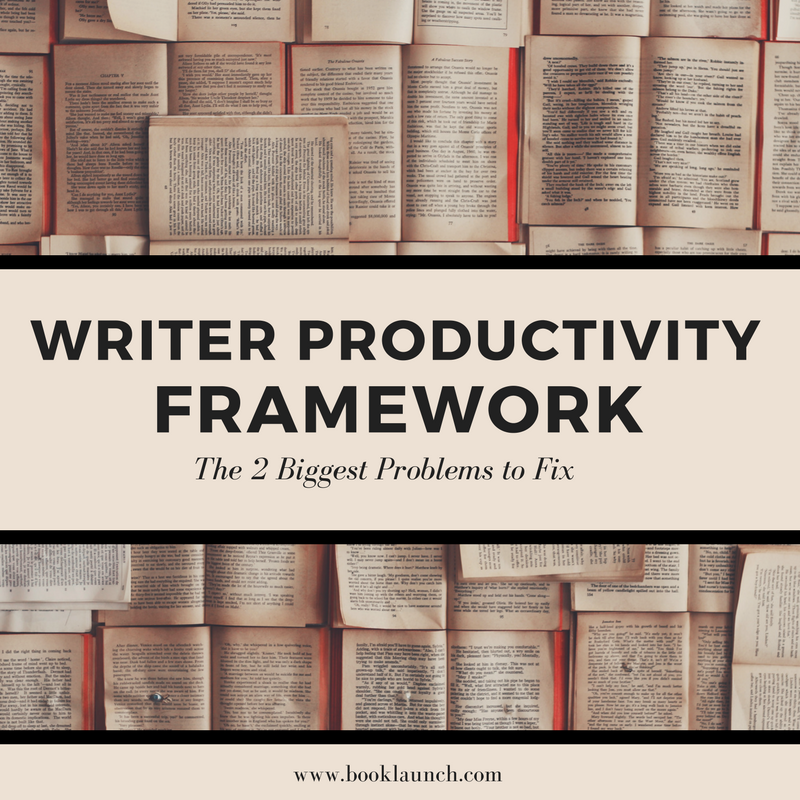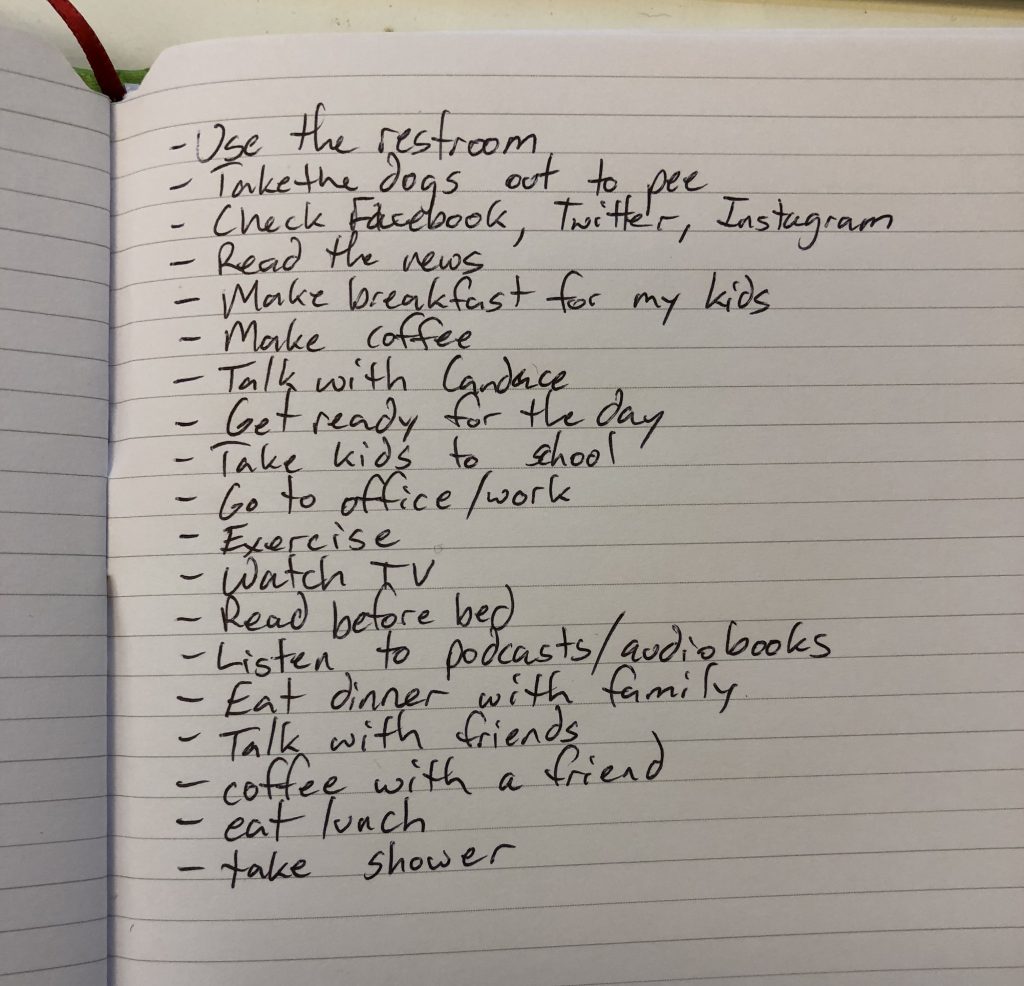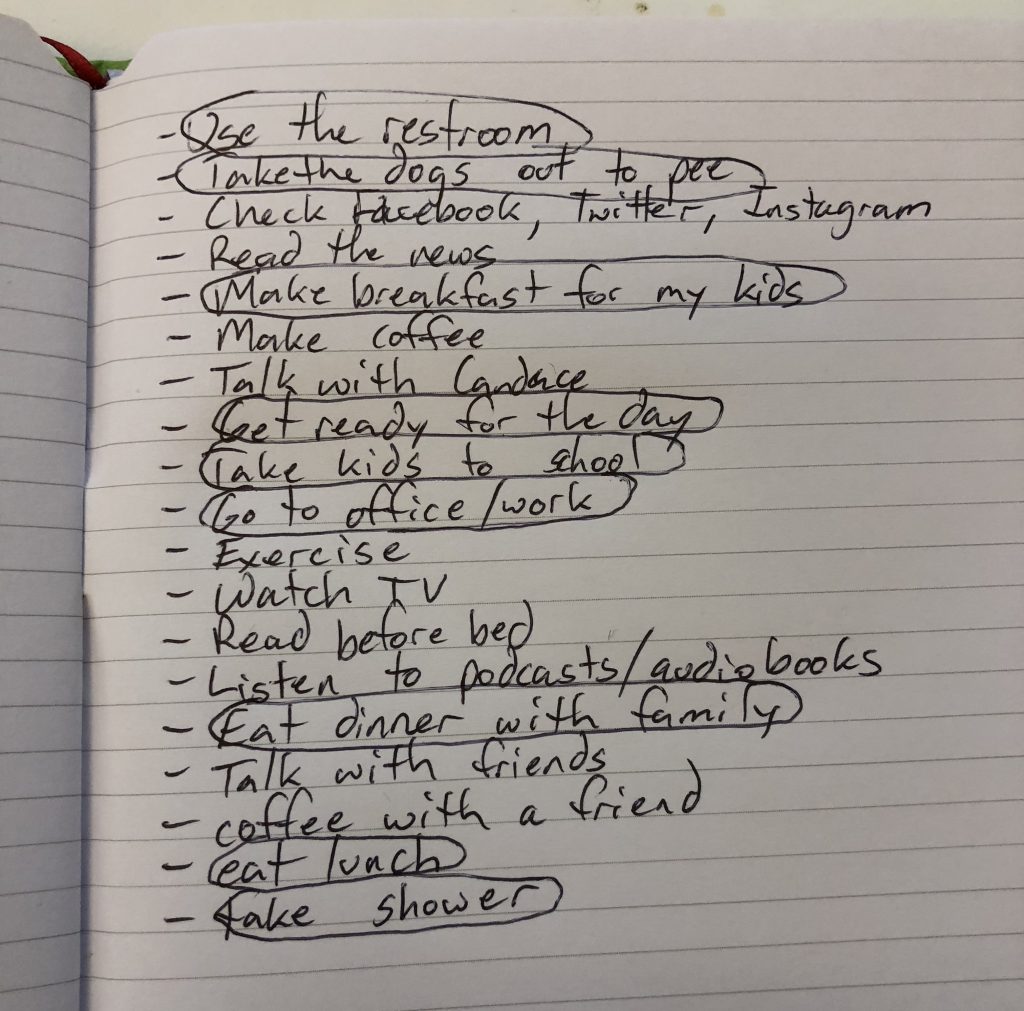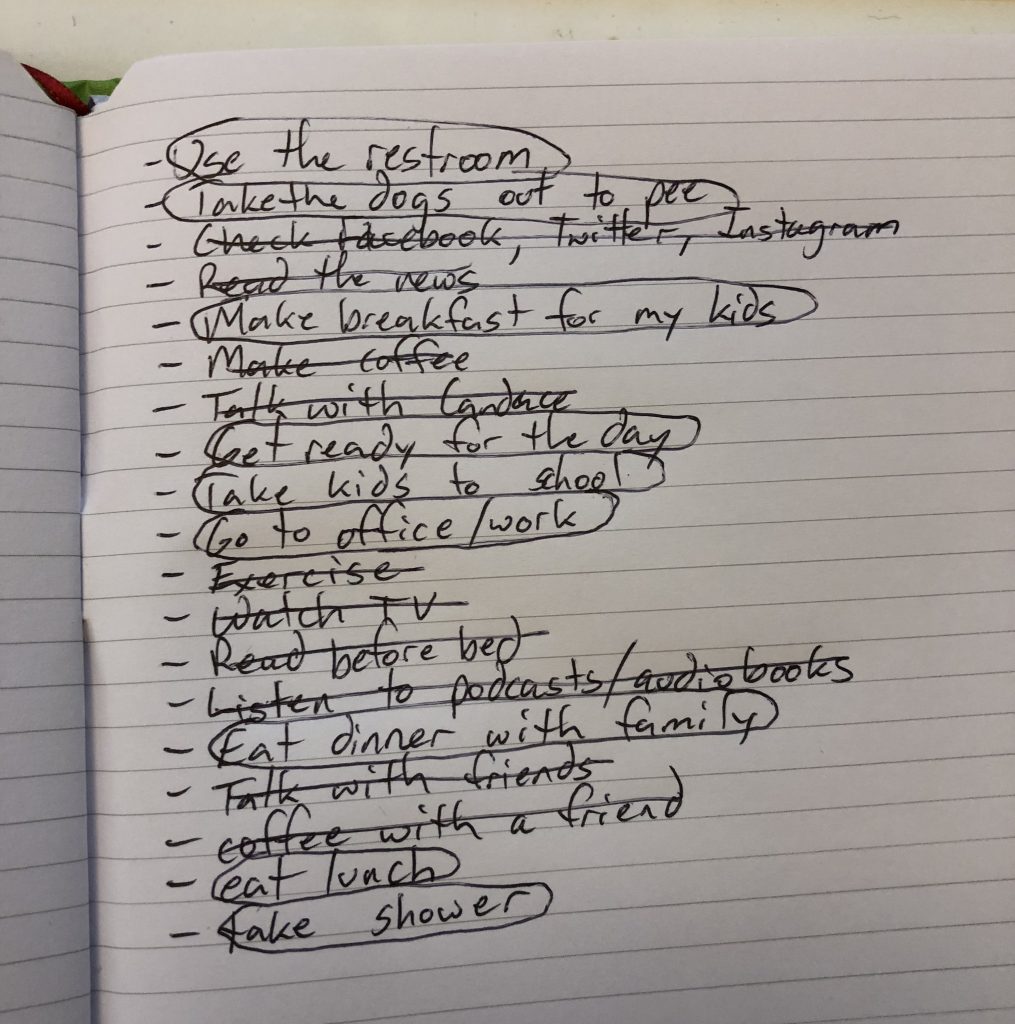We are all busy and wish we had more time to write. However, it’s often hard to figure out how we can actually go about creating that extra time. In this article I’m going to teach you a Writer Productivity Framework that I use to evaluate my time and identify ways that I can create more margin for my writing projects. This is a follow up to my article on writer productivity.

The Writer Productivity Framework
We need to start by categorizing the things we spend time on. I split all the things I do into four groups:
- Unessential – These are the things that fill up our lives but don’t have to be there. Watching television, checking social media, playing ultimate frisbee, etc. We do these for fun or pleasure.
- Essential – The things we have to do with our lives but aren’t the creative endeavors that are meaningful. Things like driving our kids to school, going to work, paying bills, going to the restroom, and exercising. We have to do these things to keep our lives running.
- Meaningful – These are things like having dinner with your family, taking your spouse on a date, or volunteering at the homeless shelter. These are things we do to add meaning and fulfillment to our lives.
- Creative – These are your writing projects and other endeavors that are fulfilling to your soul. These are want we want to spend more time doing.
The goal of this article is to free up as much time and space as possible for the Meaningful and Creative parts of our lives.
Looking at these four groups, it’s pretty easy to see that we want to have more time for the Meaningful and Creative. This means to increase our writer productivity we have to:
- Remove the Unessential – Identify and reduce the amount of time and activities in the “Unessential” category.
-
Systematize Repeated Tasks – Figure out ways to make the Essential items in your life take less time and mental energy.
If we’re able to do this, our lives will immediately and automatically become richer because we will have more time for the Meaningful and Creative activities in our lives. Let’s start here:
First, Remove the Unessential
We all have things in our life that are filling up time but not getting us any closer to our goals in life.
I want to be clear here… these things aren’t bad. Nothing in this article is meant to be a moral judgement on you or what you spend your time doing.
However, if you want to increase your writer productivity, that time has to come from somewhere. Let’s take a look at two different ways to start making changes.
Exercise 1: Choose to Choose
Somehow in our culture the phrase “I’m too busy” has become both ubiquitous and a badge of honor. We do all have a lot going on. It takes a lot of time to actually live a life.
However, what I hate about the phrase “I’m too busy” is that it inherently shifts the responsibility for our schedule off of us.
We all have a huge amount of autonomy when it comes to our lives. There are very, very few things that we have to do. Yet, we complain that we are “too busy” as if these choices were made for us.
The first step in your writer productivity is by mentally taking back control of your schedule.
You do this with one simple mental switch.
Any time you think:
“I’m too busy to ________”
You must replace it with:
“I have chosen not to prioritize _______”.
You aren’t too busy to exercise. You’ve chosen not to prioritize that over the things you currently do in your life.
But you must remember, this is not a moral judgement. Because I could also say, “You aren’t too busy to spend the entire day writing because you have chosen to prioritize paying your mortgage.”
Some of what you spend your time on is binge watching the new season of your favorite show. But then you also spend your time visiting your mother in the nursing home.
Your job at this first stage is NOT too:
- Moralize. You are not to justify your choices or shame yourself for your choices. You just watch as an impartial observer.
- Make changes. The first part is to merely notice how many times you complain in your head (or out loud) about being too busy, and then take back ownership by replacing it with “I have chosen not to prioritize.”
The first step in writer productivity is NOT to make any outwards changes, but to merely decide that you are in control and recognize that what you are currently spending your time on, you have chosen to spend your time on. Once you have done this, we can start taking action.
Exercise 2: Stop Doing Everything
Several years ago I installed a tracker on my computer. It was this little piece of software that ran in the background and logged everything I did. It kept track of how long I was in my email, getting work done for clients, writing, or browsing the internet. It also kept track of all the websites I visited and how long I spent on them.
At the end of the week it gave me a report. I was able to see just how much time I was spending on various activities during the day and I was appalled. A huge chunk of my day was being eaten up by activities that didn’t actually help me reach my goals.
Suddenly it became extremely easy to block those distracting websites and uninstall those useless programs on my computer once I saw clearly how much time I was wasting on them.
Now that you’ve taken the step of owning your decision on what’s in your life (Exercise 1), it’s time to actually evaluate what you have chosen to spend your time on.
This is an exercise that you will need a writing utensil and a piece of paper for.
I recommend you do this exercise right now. It will take about five minutes.
- List out everything that you do in a day. All of it. Get as granular as you can. Here’s an example of a partial list I might create:

- Circle everything that is Essential. Here is my criteria for what is Essential: First, you would die or get extremely sick if you didn’t do it. i.e. going to the restroom or taking your medication. Second, it is an extremely important obligation. i.e. going to work or taking your kids to school. Watching TV is not Essential. Reading the news is not Essential. Having coffee with my friends is not Essential.

- Cross out everything else left on the list.

- Live like this for five days. For one work week, Monday through Friday, only do the circled items.
- Each day of the exercise, journal about what it feels like to live like this.
- After five days, evaluate. Decide what crossed out things you will add back in, and what should stay out permanently. Some of the things you lived without for five days you’ll want to keep out permanently. Did you enjoy not being on social media or reading the news? And other crossed out things you will add back in, but you will do it decisively. You will decide you want to do these things instead of passively letting them creep back into your life.
- Do this exercise once a year. Resistance is insidious. It is slow but deliberate. Like the ivy that is beautifully and slowly growing around a tree and choking the life out of it. You must regularly reevaluate what you are spending your time on and where it is going.
It’s important to remember that I am not saying that you have to live like this forever. I watched a movie with my wife last night and I’m still getting my writing done this morning.
This is meant to shock you out of the belief that you are too busy.
This is a practice to use when your life is filling up with things and your writing productivity is getting pushed out the back door.
Also, it’s extremely important you don’t merely mentally do this exercise. You need to actually do it.
You need to feel what it’s like to be sitting on the coach at 8:00pm staring at the floor because you have nothing to do because you have not filled your life with the Unessential.
It is in those moments that you will realize that you are not too busy to be creative.
Taking one week to stop doing everything that is Unessential is the exercise that will ruthlessly open your eyes to where your time is going and it will be much easier to keep your life free of these distractions.
These two simple exercises — Choose to Choose and Stop Doing Everything — will help you start Removing the Unessential from your life.
But what about all those Essential things like taking the dog to the vet and eating lunch that we have to do but aren’t the Meaningful and Creative aspects of our life?
That leads to the second part…
Second, Systematize and Automate the Essential
Let’s pretend that your ability to focus, make good decisions, and do great work is like a bottle. Each morning you wake up with a bottle full of the ability to focus, make good decisions, and do great work. However, every single time you make a decision or have to focus or work on something, you pour a little bit out of the bottle.
Throughout the day, levels in the bottle get lower and lower and this means it’s harder to focus, make good decisions, and do great work.
Once your bottle is empty for the day, you’re done until the next morning.
This is how your brain works.
Every time you have to apply mental energy to something, you give up a little bit of your ability to apply mental energy to something else later in the day.
There are ways to increase the amount that your bottle can hold — get good sleep being the main one — but in general it’s hard to increase your capacity.
The best way to make sure that you can focus, make good decisions, and do great work is to reduce the amount of things that you have to expend mental energy on.
You do this by taking all of the Essential things in your life — the things you have to do but aren’t Meaningful or Creative — and reducing how much you have to actually think about them.
There are two exercises for this:
Exercise #3: Make Future Decisions
I like to start with this question: “What one decision can I make today that will reduce the amount of future decisions I have to make?”
Here are three examples:
- I wear the same basic outfit every single day. I have eight different colored t-shirts, two pairs of pants, and three pairs of shoes. All of them match each other. So each morning when I’m getting ready to leave, I don’t have to think about what I’m wearing. I just grab a tshirt, pair of pants, and pair of shoes and I’m ready to go. I made a decision years ago about what I wear to work every day and then I don’t have to make a decision each morning.
- I have to cook breakfast for my kids every morning. We decide on Sunday, when we go to the grocery, what they want for breakfast that week. I buy enough for the entire week and I cook the same thing for them every day. I decide once a week what my kids will have for breakfast and then I don’t have to decide (or help them to decide) every day.
- Lunch has always been an issue for me. I hate thinking ahead and packing a lunch. But then I either end of not eating lunch or picking up something unhealthy from a fast food place. Eventually, I found a meal preparation service that delivers to my gym. So each Monday I get lunches delivered to my gym for the entire week. I take them to my office, put them in the fridge, and now I don’t have to think about lunches any more. They automatically show up every single week. I decided once how to handle my lunches and now I never have to decide anymore.
The more I identify ways to make one decision today that saves future decisions, the less I have to expend mental energy thinking about, focusing, and deciding on the Essential (but not Meaningful and Creative) items in my life.
Exercise #4: Systematize Repeated Tasks
Here’s the trigger question:
“What Essential actions am I doing repeatedly?”
Then:
“How do I remove thinking from the process?” or, even better, “How do I remove myself from the process?
Anytime you find yourself doing an essential task repeatedly, think about ways to reduce the mental load of the process or completely automate the process.
First, Remove Thinking
The first step here is to focus on creating checklists.
Anything that you have to do repeatedly that has more than a few steps should be turned into a checklist.
Each week I have to edit and publish the Story Grid Podcast. It had become a huge pain for me. It would take a lot of time and I would always forget one of the fifty steps it took to get everything ready. Finally, I created a checklist. I sat down and typed out every single step in detail that has to be done to edit and publish a podcast episode. Now, I don’t have to think about it or try to remember all the steps. I just sit down and run through the checklist. It now takes less than fifteen minutes and I don’t have to think about it and, most importantly, I never miss a step.
I do something similar when I’m packing my gym bag before leaving for work. Every day I need the same seven things in my bag:
- Shorts
- Spandex
- T-shirt
- Socks
- Shoes
- Towel
- Washcloth
Inevitably, I would forget one of these things. Twice I arrived at the gym and realized I didn’t have my workout shoes and couldn’t workout that day.
So I keep the number “seven” in my head.
Everyday I pack my bag, and then I count how many things I have in the bag.
At least one morning a week I have less than seven things and it forces me to stop and figure out what I haven’t packed yet.
This allows me to mindlessly pack my bag knowing I have a system in place to catch myself if I forget something.
Anytime that you are doing a complex task (more than 3 steps), you should create a checklist.
Second, Remove Yourself
Are there any of these tasks that you can completely move off of your todo list by making it someone else’s responsibility?
The best way to do this is to hire someone.
Spending money to save yourself time is one of the few ways you can use money to make yourself measurably happier 1.
If you have created a checklist for a task, there is a good chance that you could hire someone to do that task for you.
Could you pay someone to clean your house or pickup groceries or move your blog draft from Word to WordPress? What kind of Essential tasks are you doing repeatedly? Could you move them completely out of your life by hiring someone else to do them for you?
Where does this leave your writer productivity?
I want my life to be filled as much as possible with Meaningful experiences and Creative work. The only way to do that is to remove the Unessential and reduce the time and mental overhead of the Essential.
Please hear me when I say that the Unessential/Essential items are not evil and the goal is to not completely rid your life of them.
Over the last weekend I binge watched an entire season of a television show in two days. I also checked in on social media from time to time. The focus of these exercises is to make sure that these things don’t creep so far into our life that they choke out the Meaningful and Creative moments.
Our goal is to create as much time as possible for our writing productivity. Follow the steps above and you will be surprised by how much creative time you start experiencing in your life.
Leave a Reply